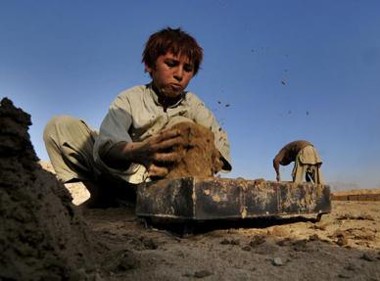The grease-covered orange overalls can't hide 14-year-old Nazer Ahmad's frail frame. As he leans under the hood of a wrecked car, torn plastic sandals on his feet, I know I cannot possibly understand the life this young boy is forced to lead in war-torn Afghanistan – where jobs are few, pay is appalling, and young children must work rather than go to school and play with their friends.

Young Afghan day labourers Amin, 13 (L) and his brother Taza, 12, make bricks on the outskirts of Kabul. Already, 30 percent of Afghan children aged 5 to 14 are engaged in some form of work. (Photo: AFP)
Nazer is one of the boy mechanics of the Sarai Malim yard in western Kabul. CNN producer Matiullah Mati has brought me here. As an Afghan, Mati sees a side of life here that the NATO generals and politicians never see.
There are dozens of young boys here - thin and frail because of a lack of nutrition brought on by staggering poverty. They are typically brought to the muddy yard by a male relative. Dozens of ramshackle huts, lean-tos and tiny one-room buildings house auto mechanics and repair shops where cars, buses and trucks are brought by local Afghans to be fixed. There is no safety gear. Welding sparks hit one young boy's eye as Nazer carries large pieces of metal across the yard. Another young boy struggles under the weight of large pails of supplies he is carrying.
Nazer agrees to sit for a few minutes to talk to me, with Mati translating. His words are few. I quickly learn he works ten hours a day, six days a week. The boss pays him less than a dollar a day. And his wages are the only income for his family of five. His father was blinded years ago in a Soviet rocket attack and cannot work. His mother has two other small children at home. Nazer has had three years of school. Then, last year, his uncle brought him here.
It takes Nazer one hour to walk from his one-room home to the yard. He arrives at 7 a.m. and begins to work. He and the boys get a morning and noon meal. At the end of his ten-hour day, this small boy walks home again, often in the very lonely dark.
When I ask if he ever plays with friends, I get a heartbreaking answer of one word: "No." In Nazer's world there is no time for play. He tells me he just works and there is "no time for fun." He tells me he is happy to have the job and be able to help his family.
But these boy mechanics of Kabul do have dreams of another life for themselves - and, remarkably, for their country. Nazer tells me he would like to go back to school and become a teacher. He says he feels it's a way he can "serve" his country.
Throughout our chat, Nazer never smiles. Not once.
Across the yard we meet 12-year-old Mohammed Azam inside one of the dark shops, bent over his cooking pots. His father brings him here to cook for the workers and then he can go to school. Mohammed says he doesn't want to be a mechanic. He says he wants to be a doctor so he can "serve society."
Mohammed's father Najibullah has a philosophical outlook tempered by the reality of life in this country. "Knowledge is good, education is good. But most of these boys are poor and they must work."
CNN's Matiullah Mati contributed to this report.



